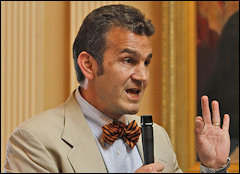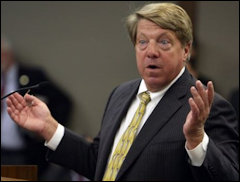
Sen. Chap Peterson. Photo credit: Associated Press
The Senate Commerce and Labor Committee today killed a bill championed by Sen. Chap Petersen, D-Fairfax, that would have ended the freeze on base electric rates, restored State Corporation Commission (SCC) control over rate setting, and enabled the refund of hundreds of millions of dollars in electric utility profits to rate payers.
Senate leaders said that they are working on legislation that will direct the long-term future of the electric utility industry, subsuming the regulatory topics that Peterson’s would address. “There will be a larger conversation that will take place in the next week,” said Senate Majority Leader Tommy Norment, R-Williamsburg.
Peterson has pushed for a return to the regulatory regime that existed before 2015 when the General Assembly, worried about the potential impact of the Obama administration’s Clean Power Plan, enacted a freeze on base rates and canceled biennial SCC reviews. Peterson contends that Dominion Energy Virginia has earned excess profits of more than $400 million. Moreover, the new federal tax law will reduce Dominion’s tax bill by $150 million a year. His bill will protect rate payers, he said. “This is not an environmental bill. It’s not a pro-business bill. It’s a pro-ratepayer bill.”

Sen. Frank Wagner. Photo credit: Helment2Helmet
However, Committee Chair Frank Wagner, R-Virginia Beach, said the legislature needs to consider rate regulation in the context of building an electric transmission/distribution system that can accommodate more solar power and keep the grid secure and resilient. Virginia needs to upgrade its grid, he said. “We’re not there — we’re not even close to where we need to be.”
About a dozen speakers mainly representing consumer, environmental and business-customer interests spoke in favor of Petersen’s bill.
In remarks typical of those who supported Petersen, Sam Towell, with the office of consumer council for the Attorney General’s office, argued that Virginia should return oversight of the electric power companies to SCC judges who have the staff and expertise to review complex regulatory issues. “If the rates are too high, as they currently are, the SCC should have the authority to lower them,” he said. “If utilities make prudent investments, they should have the opportunity to recover their investments with a fair rate of return.”
Another advantage of SCC oversight, said Louis Monacell, an attorney representing the Virginia Committee for Fair Utility Rates, is that the public hearings allow for the production of documents and questioning of experts. In contrast to Dominion with its army of lobbyists, who meet with legislators and aides in settings where people don’t have a chance to challenge their assertions, he said, “the SCC bases its decisions on an open record.”
Norment said he was “taken aback” at the insinuation that legislators aren’t getting all viewpoints. “How can you stand there and tell me that your voices are not being heard?”
Dominion has a far greater financial interest in the outcome of the legislative process and can afford to hire more lawyers, lobbyists and experts, responded Monacell.
“We think the consumers do have an articulate voice,” as evidenced by the number of speakers at the hearing, said Norment. “And now they have an Attorney General who is serving their interests more than ever before.”
As Virginians ponder how to restructure the electric utility industry, said Wagner, the General Assembly needs to transcend the “myopic,” two-year time horizon of the SCC and adopt a longer-term perspective.
“It’s very clear that the Clean Power Plan is not moving forward,” Wagner said. “We have a degree of certainty that we didn’t have three years ago. This is the time to go back to a re-regulated environment.” Still, the General Assembly sets the broad parameters for energy policy. Solar is competitive now with every other form of electricity. Decisions must be made how best to integrate it into the grid without throwing off frequency and voltage, while also protecting the grid against a range of threats from hurricanes to cyber-sabotage, he said.
“We have huge changes coming,” said Wagner, echoing many of the same points that Dominion executives raised last month when announcing their openness to end the rate freeze. “More electric vehicles, more batteries, more storage, more generation at the [local] level. …. We need to look a decade down the road.”
Update: An earlier version of this post said that the Committee “tabled” Petersen’s bill. In fact, committee members voted to “pass by indefinitely,” which I am informed is legislative jargon for killing the bill. I have rewritten the article to correct the mistake.


